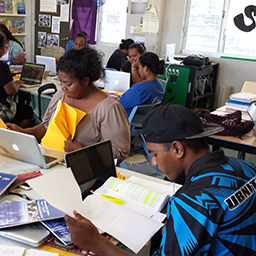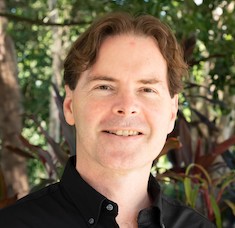Department of STEM Education
 As STEM (science, technology, engineering and mathematics) educators, we and our students teach and research science, digital technologies, mathematics and agriculture.
As STEM (science, technology, engineering and mathematics) educators, we and our students teach and research science, digital technologies, mathematics and agriculture.
At present, STEM education is highly valued in Australia and internationally because of its potential contributions to innovation and prosperity. We value and are committed to this goal. We also value STEM education because of the contribution it makes to equipping people to live well and sustainably in the natural and constructed, physical and social environment. We have a strong focus on developing innovative, inclusive and culturally sensitive approaches to teaching STEM in Australian and international classrooms.
Our research is characterised by our openness to working with others within and outside the university and the region. We have a strong record of cross-disciplinary cooperation and collaboration.
Our subject areas
STEM literacy is essential for productive engagement with contemporary society. Our subject areas help educators to support and engage their students in learning and learning about a range of STEM disciplines. We are one of very few universities to offer agriculture education as part of a teaching degree.
Our partnerships
We have strong partnerships with scientific, technical and education organisations to engage young people and adults in learning STEM. Other established and productive partnerships provide expertise and support for STEM curriculum development and teacher education in the Pacific region.
Several of our academics are engaged as mentors in the NSW Department of Education 'eGATS' program in the New England region, which provides engaging and challenging online learning activities for academically able students. During the 10 week program, students are linked to expert mentors and designers and work individually and in teams to complete challenging online tasks in a variety of formats. Our mentors provide regular feedback and support and lead reflection as part of the program. Education is a key driver of the health, economic growth, sustainability and well-being of a community. Improving equity in access and participation in education improves not only a person's employment opportunities, but also reduces gender-based domestic violence and enhances community tolerance of cultural differences. Local role models, in the form of local teachers, are critical for sustainable growth. Our Pacific Projects, predominantly in Nauru and Tuvalu, aim to develop and test a model for advancing culturally responsive pathways for teacher education in rural and remote locations, and disadvantaged students. The collaborative approach blends cutting edge research from rural and remote locations in Australia, and small Pacific Island nations. The Nauru Teacher Education Project builds on findings emerging from the design and delivery of the University of New England (UNE) Associate Degree in Teaching (Pacific Focus) and the Bachelor of Education (Pacific Focus), which provides pathways in early childhood, primary and secondary areas of study. Our team's core research is to develop an evidence-based strategy for enhancing quality teacher education in remote Pacific Island nations. We collect empirical evidence that is used to refine and improve the program, and share our findings with a wider audience. We have collected both qualitative and quantitative data 2011 to present, including interviews, observations, surveys, student results, professional experience videos and qualitative student participation records. This data informs our team about student engagement, strategic program direction, mentorship requirements and goal achievement. We provide our partners with regular, in-depth feedback about project progress. Researchers: Associate Professor Pep Serow, Dr Terry Sullivan Project partners: Nauru Government Department of Education, Tuvalu Government Ministry of Education and the Australian Government Department of Foreign Affairs and Trade (DFAT)
Our research
Our research is strong and eclectic. We ask rich, interesting and provocative questions about interdisciplinarity and STEM Education; STEM classroom practice and pedagogy; and STEM curriculum. A feature of our work is our strong capacity for durable external partnerships, many of which cross disciplines.
Our mathematics education researchers are engaged in mathematics education projects across a number of European, Asian, Pacific and Middle Eastern nations. We are proud to be able to promote the development of mathematics education around the world, and help optimise mathematics skills and learning opportunities for primary and secondary students. Our mathematics education projects operate in: Research and consultancy Regionally, our research and consultancy has targeted student-centred learning, teacher professional learning, assessment for learning, curriculum development, technology as a teaching tool, mathematics for Aboriginal learners, and inclusive education practices. We've delivered projects in regional and remote Australia and interstate. Researcher: Associate Professor Pep Serow. Other initiatives include Out-of-field Teaching: Sustaining Quality Practices Across Subjects, funded with a recent Australian Research Council Discovery grant. Perceptions and practices of mathematics and science teachers In this joint project, our researchers investigated the perceptions and practices of teachers who are teaching secondary school mathematics and science out-of-field in rural and regional NSW, Victoria and Queensland. The study, Out-of-field Teaching: Sustaining Quality Practices Across Subjects, also investigated the associated school institutional culture relating to teaching allocation and support for such teachers. Longitudinal data collection over three years using multiple interviews with targeted school teachers and administrators is being utilised to inform the development of system and school policy and practice in dealing with this issue. Researchers: The research team includes Dr Frances Quinn alongside Deakin University (Lead) and Queensland University of Technology.
Contact us
To find out more about our department, please contact:
 Head of Department, STEM Education
Head of Department, STEM Education
Associate Professor Brendan Jacobs
Email: eduhod-stem@une.edu.au

